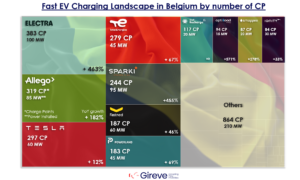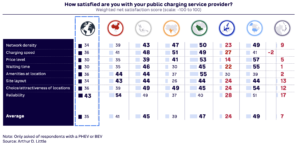Germany has reached a pivotal moment in its journey towards sustainable transportation, surpassing 1 million battery electric vehicles (BEVs) on its roads as of December 2022. This achievement underscores the nation’s commitment to its target of 15 million EVs by 2030, a crucial component of the European Union’s broader goal of 30 million EVs across the bloc by the same timeline.
The German EV charging market exhibits a high degree of fragmentation, with over 100 companies each operating a minimum of 100 public EV chargers. This fragmentation is further highlighted by the fact that the top 10 companies collectively control less than 20% of the market share. Leading players include EnBW, E.ON Drive, EWE Go, Westenergie Metering, and Volkswagen’s Elli, with a diverse range of market participants from pure players like Allego and Fastned to automakers, fuel station operators, utilities, food retailers, renewable energy developers, and auto dealers.
This highly competitive landscape is giving rise to innovative collaborations and alliances. Examples include the partnership between Aral Pulse and Apcoa Parking Group to enhance fast-charging locations, Volkswagen and BP’s alliance for installing fast-charging points across the UK and Germany, and the joint venture between the Traton Group, Daimler Truck, and Volvo Group aiming to set up a vast network of high-power charging points for electric trucks across Europe.
These collaborations are not just about expanding the physical infrastructure; they are also focused on improving the overall customer experience and making electric vehicle charging more accessible and convenient. This customer-centric approach is seen as a key driver for further adoption of EVs in Germany.
The German public EV charging market is evolving rapidly, with industry players needing to differentiate their offerings through innovative business models, smart charging solutions, and strategic partnerships. The government’s support in creating a favorable business environment plays a pivotal role in fostering growth and innovation in this sector.
As Germany continues to invest in and expand its EV charging infrastructure, it sets a precedent for other countries aiming to transition to sustainable transportation solutions. The next few years will be critical in shaping the landscape of electric mobility, not just in Germany but across Europe.
Source: Apricum




